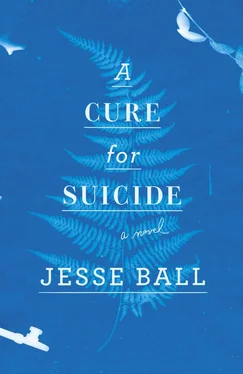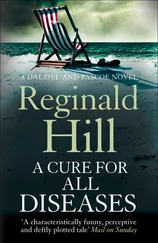— But, what is there to do?
— I think we can leave, said Hilda. I think that it is possible to leave. It’s true that people come. People who were not here before come here now. Even if for us it isn’t entirely clear — I believe that I was in several villages before this, but it might not be true. I might always have been here: despite that, it appears true that others who were not here are suddenly here one day. If that’s so, they come from somewhere, and we can go there, to the place where they came from, and to places beyond that. I’m sure of it.
Martin nodded.
She began to touch his hair and face, and he sat quietly in these attentions for some time.
— I have a present for you, she said.
She handed him several sheets of paper. They had been torn out of a book.
— Read them later. Goodbye for now.
The claimant sat in the wood and looked at the pages. They were, they must be — from the examiner’s book. There in neat lines of type he found a description of the gentlest village as though it did not yet exist. He found a description of the role of examiner and rules for how an examiner ought to be. He was partway through such an explanation when he reached the end of the torn-out section.
If she had torn this out of the book, it must happen that they would discover it. Why would she give it to him? Would he now be guilty of her deed?
But something in him spoke up, and that voice said:
You are a fool if you think she did this for any reason but one: she loves you and wants you to be sure of her.
And a thick warmth rose in his chest and face.
He looked up. No one was near him.
He put the pages in his pocket, and set out home.
THE CLAIMANT woke, and he looked at the ceiling. It was the same plaster ceiling it had always been. The shapes of leaves were evident, shadows from the branches that abutted the window. His eye traced them and found a path from one end of the room to the other. He sat up and found his feet.
All of a sudden, he thought, all of a sudden, nothing is enough for me.
It was as if there were moments of strength in which he could understand everything that Hilda said to him, and then moments in which he felt that it was not worthwhile to, or that it was too much — that too much was required from him to do so. He thought again of the way the examiner had said — you must listen to stories, not to understand, but merely to be human. For Hilda, was it enough for him to just listen, or did he need to understand?
When she was there, he felt the injustice of the whole thing, and he wanted to help her, he wanted to act. But here, in the comfortable house, with the examiner and their botanical work, with their quiet breakfasts and long walks, he felt a long light dim evenly, all along the horizon. He felt what was bright and new grow worn. He knew that the sterling fierce things were no concern of his. He need seek no conflicts, no unveilings.
He was at the head of the stairs. He found his way down them, and to the table, and he began to draw. The examiner came in and sat next to him. She said nothing. She did not look at him. But a good feeling was there in the claimant. He was recovering. It wasn’t a lie. He had been sick. He was sure of it. And then a thought rose in him. Maybe Hilda was sick. Maybe Hilda was still sick, and she had just deceived everyone. Maybe she was deceiving him.
There! He had spoiled the drawing.
He pushed it to one side, laid out another sheet, and started over.
THE EXAMINER took him for a walk that evening.
As he closed the gate, she asked him what it meant for something to die.
— What I am asking is, what is the meaning of death? If you wonder why I am asking, it is because, like everything else that we do here, this question is an arrow aimed straight at your recovery, your renewal. A person who does not know what death is can never be a healthy person. Such a person can only stumble along awaiting some final confrontation wherein their ignorance is exposed. At such a time, that person will learn, or break. So that you do not need to go to such a confrontation alone, we will speak of it now. And so, I ask you, what is death?
He closed the gate.
Her old face peered up at him. She had bound her hair back in a braid, and she wore a heavy coat unsuitable for the season. She often wore more clothes than were necessary. Of a sudden all her frailties came to light. She was much closer to death than he. How old was the examiner?
— You are thinking about my age, she said. When I ask you about death, it is my death that comes to your mind. And it is rightful for that to be the case. Your empathy gives you that gift. You empathize with my life and with my death, and so you think, this old woman, she is soon to die, and as you imagine my death and my passing, you experience it to some degree. What is that like?
THE CLAIMANT thought of the examiner, who had always been so strong, faltering. He thought of the triviality of it — that some random place should be the site of her death. That she would lie on the ground, everything spinning about her, and breathe her last. And then he thought of the uselessness of her clothing, of all the things that had been cut to her size, of all the tools that had been shaped under her hand, of everything in her life that had been measured to her — how useless it would all suddenly become. And he thought of how the world would rush into the space where she had been, and occupy it with something else. He began almost to cry, and tears gathered in his eyes. He felt very much that he loved her. She was his family, the whole of it. He loved her.
The examiner saw this, and took his hand.
— Walk with me, she said.
They walked up the street to where a thin path ran between rocks up a hill. They followed that path and came to a wrought iron gate at the hilltop, where a fence barred their way. The examiner opened the gate and they went through.
A long, rolling yard lay before them, going off down the hill to a distant tree line. Somehow the claimant had never been here before. His eyes crossed the landscape again and again, as if looking for something. He knew what this was. He was sure of it.
— These stone markers, said the examiner, they are called gravestones.
— Gravestones, the claimant repeated.
— No one uses these anymore. But once they were common everywhere. They make a clear point, and a resounding one, and so they have become a part of the Process of Villages. We re-create this cemetery in every village. It is even there in the distance in the gentlest village, though perhaps your eye did not find it there.
— But what is it? What are these stones for?
— Let’s walk between them.
So, they walked up and down the lines of gravestones, and the claimant read them, and soon saw what they were for. The examiner said nothing, but looked on with her steady, impassive face, and did not indicate whether she thought that it was a good thing, this idea: cemetery, or whether it was a foolish human development that we were better rid of.
The claimant felt in the stones a great yearning. He felt that it was reflected in his own being at that very moment. The manner in which he was torn — his confusion in Hilda, of Hilda, about Hilda, his sadness for the examiner, and for her death — he felt very clearly what it was to be human at all and how it was encapsulated in the stones themselves.
— They are the error — our human error, he said. It’s what makes it worth living at all. But also, it is completely irrational. They have no reason in them.
— What do you mean?
— I mean, if someone is dead, then that person is gone. A gravestone does nothing to fix that. And if it makes a place that others can go to be near the body of the dead person — then how does that help anything? It just prolongs the grieving. Better to simply pass on along the road, thinking nothing of it. But,
Читать дальше












